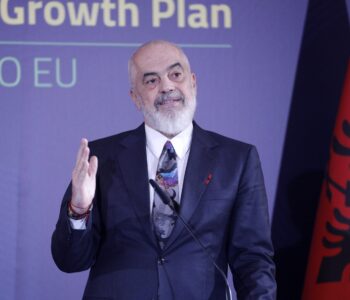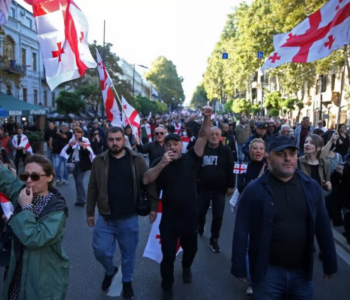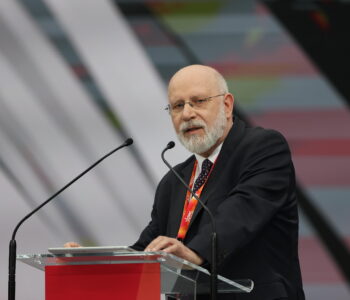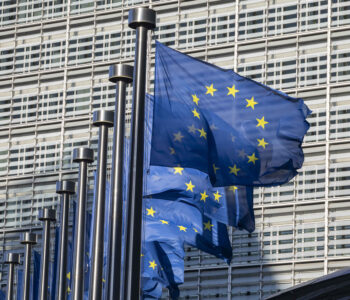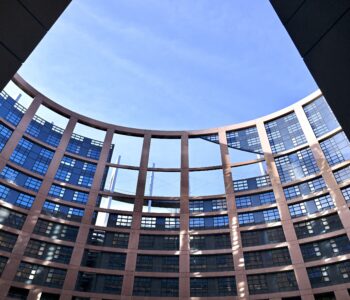
The MFRR Summit 2025 brings together journalists, policymakers, and civil society to address the urgent challenges facing press freedom in Europe. From disinformation and digital threats to shrinking media markets and political pressure, journalism is under strain, and journalists need stronger protection and support.
This year’s Summit feeds into EU Democracy Shield policy discussions and highlights journalism as vital democratic infrastructure. Drawing on MFRR’s monitoring, missions, and policy work, the event will explore five key pillars of media resilience: economic viability, safety, legal protection, AI governance, and implementation of safeguards.
The full programme and speaker details are now available below, and registration is officially open. Secure your place!
Welcoming Message
09:00 – 09:10 CET
Opening Keynote
09:10 – 09:30 CET
Panel 1: Media Economy Under Pressure: How to Ensure Economic Viability
09:30 – 10:30 CET
From platform ad monopolies and collapsing business models to biased state funding and increased far-right influence, today’s public interest media sector is economically destabilised. This panel will address urgent issues and spotlight policy solutions: market reform, including reformed copyright, tax incentives, direct support with safeguards, and breaking VLOP dependency.
Alina Păduraru ↦
Executive Manager at Recorder
Anna Herold ↦
Head of the Audiovisual and Media Services Policy Unit at the European Commission
Sarah Murphy Madia ↦
Journalist and Policy Lead at What to Fix
Salla Nazarenko ↦
International Affairs Specialist at Suomen Journalistiliitto
Moderated by Renate Schroeder ↦
Director at the European Federation of Journalists (EFJ)
Panel 2: Unsafe to Report. Why Journalists Keep Looking Over Their Shoulders
10:45 – 11:45 CET
Mapping 1,500+ press freedom violations in 2024 (MFRR Monitoring Report), this panel focuses on states where enforcement is failing, and threats are escalating – from police violence at protests to online smear campaigns and digital intimidation, often initiated or supported by power holders themselves. Discussion will zoom into the MFRR findings from its recent on-the-ground missions, highlighting the most urgent safety issues and discussing possible solutions.
Irma Dimitradze ↦
Communications Manager and Journalist at Batumelebi and Netgazeti
Hamdi Firat Buyuk ↦
Journalist and Editor, BIRN
Valentina Grippo ↦
General Rapporteur on Media Freedom and Safety of Journalists, Parliamentary Assembly of the Council of Europe
Wael Eskandar ↦
Visual Impact Producer at Lighthouse Reports
Yanis Mhamdi ↦
Investigative reporter at Blast
Moderated by Ena Bavčić ↦
EU Advocacy Officer at the European Centre for Press and Media Freedom (ECPMF)
Panel 3: Spoofing, Surveillance, Spyware. Journalists against Digital Threats
13:00 – 14:00 CET
AI is reshaping journalism in multiple ways; while some are helpful, others are an imminent threat. AI and other advanced digital tools are used to erode trust, funding, and safety of journalists. Experts and journalists will address digital threats and discuss how to mitigate them via policies and structural support to journalists.
Dragana Obradovic ↦
Director of the Balkan Investigative Reporting Network (BIRN) in Serbia
Francesco Cancellato ↦
Editor-in-chief at FanPage
Stanley Kwenda ↦
Strategic Communications and External Affairs Advisor at Amnesty International
Asha Allen ↦
Director and Secretary General of the CDT Europe Office
Sarah Thust ↦
Journalist at the Fact-checking Team at CORRECTIV
Moderated by Dimitri Bettoni ↦
Researcher at Osservatorio Balcani e Caucaso Transeuropa (OBCT)
Panel 4: Legal Protections. EMFA, Anti-SLAPP Directive: Implementation Highlights and Challenges
14:15 – 15:15 CET
With the Anti-SLAPP Directive and EMFA passed, the real battle is in national transposition. MFRR will ground this discussion into its close observations of challenges that implementation of the protective laws faces and the developments on the ground in regards to the new legislation and regulations. How do we ensure that the “good” laws make real change in safeguarding free and independent journalists?
Marius Dragomir ↦
Director at Media and Journalism Research Center
Danai Maragoudaki ↦
Journalist at Solomon
Flutura Kusari ↦
Senior Legal Advisor at the European Centre for Press and Media Freedom (ECPMF)
Dora Kršul ↦
Investigative Journalist, Telegram, Croatia
Moderated by Oliver Money-Kyrle ↦
Head of Europe Advocacy and Programmes at International Press Institute (IPI)
Ukraine Spotlight Interview
15:30 – 16:00 CET
Inna Varenytsia ↦
War Correspondent & Filmmaker
Tetiana Zhukova ↦
Senior International Advocacy Manager at the Human Rights Centre ZMINA
Moderated by Katia Mierzejewska ↦
Communications and Media Officer at ARTICLE 19 Europe
Panel 5: The Authoritarian Playbook. Foreign Agent Laws in the EU’s Shadow
16:15 – 17:15 CET
While protective regulations face implementation challenges, other laws, with potential to seriously damage media freedom and modeled after Russian “foreign agents law”, are mushrooming across Europe. From Hungary to Georgia, “foreign interest” rhetoric is creeping into policy. This panel tackles how the spread of “foreign agent laws” and hostile „foreign influence” rhetoric are being weaponised to stigmatise and pressure critical journalists, ultimately threatening media freedom and democratic participation.
Tamás Bodoky ↦
Journalist, Editor and Publisher at Atlatszo.hu
Lia Chakhunashvili ↦
Executive Director of the Georgian Charter of Journalistic Ethics
Ivana Korajlić ↦
Executive Director at Transparency International in Bosnia and Herzegovina
Dragana Obradovic ↦
Director of the Balkan Investigative Reporting Network (BIRN) in Serbia
Moderated by Flutura Kusari ↦
Senior Legal Advisor at the European Centre for Press and Media Freedom (ECPMF)
Closing remarks
17:15 – 18:30 CET
Co-funded by the European Union. Views and opinions expressed are however those of the author(s) only and do not necessarily reflect those of the European Union or European Education and Culture Executive Agency (EACEA). Neither the European Union nor the granting authority can be held responsible for them.
